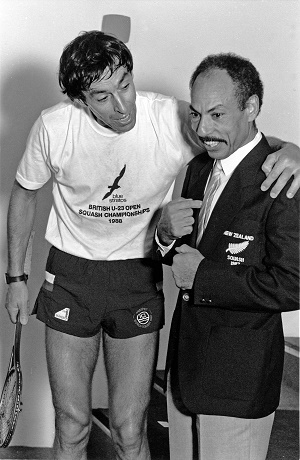Legendary Egyptian Coach, Dardir El Barkary Passes On
16 Dec 2015
Photo: Dardir El Barkary, the New Zealand team manager (left), shares a joke with Jonah Barrington
World famous squash coach Mohamed Dardir Ali El-Bakary, known to thousands as Dardir, passed away in Egypt in October. News of his death has just become known to the squash world.
Dardir, a world-class player in the 1950s, became one of the world’s first and most famous international coaches. He played with the Khans on tour and at the British Open, but his real fame was as a coach. He was mentor to the Egyptian’s Abrahim Amin and AbouTaleb.
He was also there at the start of the Australian squash boom, working with Heather McKay and Ken Hiscoe. Later he moved to New Zealand, settled there, and became National Coach, dragging a squash backwater into a significant international force.
He had a number of careers in coaching in Egypt, England, Australia and New Zealand. After retiring he returned to England to work at the job he loved and based himself at the Colets Club in South London.
“We do it for more than money. If you develop a player who goes to the top you feel good about it. You are happy that you moulded that player,” he told Squash Player magazine.
'I am delighted,' he says. 'I can say it for myself. I have achieved three successes in three different countries.'
At the end Dardir was lost to the sport. He left his beautiful New Zealand home, lived on the Gold Coast in Australia, and returned to Egypt to live quietly away from sporting limelight. He died in October 2015.
One of the greatest coaches ever
Editor Ian McKenzie remembers the life of the legendary Egyptian coach, Dardir El Barkary
It was a type of pilgrimage, travelling to the large George Courts Department Store in Auckland in New Zealand. There in the basement was a short man, 5ft 4ins tall, stringing rackets, organising the merchandise, charming customers and welcoming you as a friend with a big smile.
You would ask what it was like to play the Khans and he would regale you with stories of a past age of squash. The enthusiasm was infectious, engaging, humorous and matey.
It was a long journey to that department store, where broken strings were repaired and cracked wooden rackets glued and bound like fishing rods – a long way from coaching in the gentleman’s clubs of London – but he liked the New Zealand way of life. Here was the most famous player in the country and possibly the most famous coach in the world, but you could just go in and talk to him, ask for advice and be educated in parables.
Mohamed Dardir Ali El Bakary started playing squash in Cairo in 1949 to sharpen his reactions for cricket. He took lessons, practised on the courts at night and ran to improve his fitness, but the lessons ended abruptly. He was becoming too good!
The story goes – there was always a story! – that Dardir entered his first tournament in Alexandria to challenge his former tutor and beat him. Exhausted, though, he was ordered to rest by a doctor and could not continue in the event. Unbeknown to him, he had entered a professional event, lost his amateur status and his cricket career was over – but a new one in squash was born.
Dardir turned to coaching and became the professional coach at the National Sports Club in Cairo. In the early 50s he won the Egyptian Open and Professional Championship, and moved to the Gezira Squash Club.
On occasions he travelled to London to compete in tournaments and in 1958 toured Canada and the USA with the Khans – Hashim, Roshan and Azam. “He was as good as them, but they were able to upset him,” said Geoff Hunt, the Australian maestro.
While coaching his pupils – Abdelfattah Abou Taleb, Ibrahim Amin and Tewfik Shafik – in London, Australian Ken Hiscoe asked to be included in the squad. Later Dardir worked with Heather Blundell (McKay) and was invited to coach in Australia, travelling back with her in 1961.
“He did a lot of work with Kenny,” said Hunt. “He taught him how to hit the nick.” And it was Hiscoe who led the new generation of Australian players.
Dardir was based in Sydney for some time, invited to New Zealand and eventually settled there with his Australian wife, Helen, and their two children, Adam and Lisa.
The Egyptian player, Abbas Kaoud, who lived with Dardir’s family in Auckland for a year, said: “He is one of the greatest coaches ever. He did a lot for Australia. He coached Ken Hiscoe to win the first British Amateur for Australia. In New Zealand he became national coach and was a big influence on Bruce Brownlee and later Ross Norman. As a person he was a very nice man.”
It is hard to over-emphasise his influence in New Zealand. He toured the country, dispensing wisdom and skill.
Dardir wrote a book there with co-author Garth Gilmour called Dardir on Squash. It was a classic. Buy one if you get the chance.
After his first marriage ended, he married Sherryn. They worked in his sports retail business and retired together on the island paradise of Waiheke in Auckland’s Hauraki Gulf. However, on a trip to England he was again drawn into coaching. He loved it and settled at the Colets Club in Surrey, coaching members and professionals like Australian Michelle Martin.
“You know what it is like, Ian,” he told me. “You are like a little flower and when someone gives you appreciation, you open up and give of yourself.”
He was also in demand in Europe. The New Zealander, Tony Griffin, author of The G Spot, A Book About Squash, invited him to Barcelona to give clinics.
“I remember as a youngster the excitement when we heard that Dardir was going to give a coaching clinic in our small club,” said Griffin. “I still remember marvelling at the way he floated around the court in his black and red flaired tracksuit pants. He made the ball talk. He was both educational and entertaining. I now realise that was his secret.
“Quite a few years later I organised for him to come to Barcelona and train our team. He had the same passion I had remembered and was still looking for new and improved ways to help young players improve their skills. He had just thought of a new metaphor to describe a squash swing. He likened it to the way an Italian ice-cream cone was made. Apart from the metaphor, the wonderful thing was the sparkle in his eye and the excitement in his voice when he explained it to me.”
Dardir then returned to New Zealand, lived for a while in Australia on the Gold Coast and was lost to the sport. In later years he returned to Egypt, but mystery surrounds the details.
Kaoud said: “He came years ago and didn’t tell anyone. No one knew, not even me, and I was very close to him.
“He bought a big house for himself and another for homeless people. He looked after them. That is what he did.”
Dardir passed away in October 2015.
---------------------------------------------------------------------------------------------------
BOXOUT
SQUASH PLAYER FEATURES ON DARDIR:
1. Dardir departs (August 1993)
2. Dardir: The Australian connection (September 1993)
3. Dardir Down Under (November 1993)
See squashplayer.co.uk/features
<< Back










